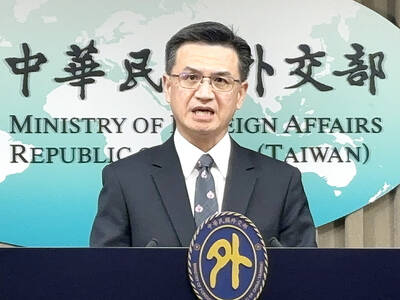The Ministry of Transportation and Communications (MOTC) is seeking an additional subsidy of NT$5 billion (US$175.9 million) to sustain the nation’s international airlines, which are still struggling to survive amid the COVID-19 pandemic.
Since February last year, the government has given out a total of NT$16.47 billion in relief funds to help the carriers, whose operations have been severely disrupted by government-imposed restrictions on air travel to contain the spread of COVID-19, the ministry said yesterday.
As the threat has not eased and as the one-year relief program expires at the end of this month, it is necessary for the government to allocate more money, it added.
The additional funds would help more than 300 airlines and airport business operators, and sustain 10,000 workers at airports, it said.
In February, the Legislative Yuan passed the Special Act on COVID-19 Prevention, Relief and Restoration (嚴重特殊傳染性肺炎防治及紓困振興特別條例), which the government is to enforce until June 30 this year.
As such, the ministry is seeking to secure about NT$5 billion more in relief funds in the hopes that the money would sustain the airline industry for another six months.
The Executive Yuan would make a final decision on the matter after examining how different government agencies have been using the relief funds given to them to see if there is any more funding for the transport ministry’s proposal, it said.
Part of the relief funds for the airline industry was used to help carriers with fees for landing aircraft, leasing government-owned properties and housing, and using aircraft maintenance hangars, the ministry said.
The rest was given to duty-free shops or other business operators at airports, as well as ground and airline catering service operators, to cover their expenses, the ministry said, adding that employees hired by these companies received additional subsidies as part of their salaries.
The ministry also secured a government-backed business loan of NT$50 billion for the airline industry last year and a one-year subsidy to cover the interest accrued from the loan.
Minister of Transportation and Communications Lin Chia-lung (林佳龍) last year said that an additional NT$25 billion government-backed loan had also been requested.
It awaits the Executive Yuan’s approval.

Chinese President Xi Jinping (習近平) yesterday met with former president Ma Ying-jeou (馬英九) at the Great Hall of the People in Beijing, with Xi’s opening statement once more emphasizing that people on both sides of the Taiwan Strait are Chinese and that foreign intervention cannot change their inevitable unification. Xi said that 5,000 years of history of zhonghua minzu (中華民族, ethnic Chinese group) have seen their ancestors move to Taiwan to establish new lives, while also documenting them fighting side-by-side against foreign forces and finally freeing Taiwan. “Both sides are Chinese,” and there are no issues that cannot be worked through, he

BULLY TACTICS: Beijing has continued its incursions into Taiwan’s airspace even as Xi Jinping talked about Taiwan being part of the Chinese family and nation China should stop its coercion of Taiwan and respect mainstream public opinion in Taiwan about sovereignty if its expression of goodwill is genuine, the Ministry of Foreign Affairs (MOFA) said yesterday. Ministry spokesman Jeff Liu (劉永健) made the comment in response to media queries about a meeting between former president Ma Ying-jeou (馬英九) and Chinese President Xi Jinping (習近平) the previous day. Ma voiced support for the so-called “1992 consensus,” while Xi said that although the two sides of the Taiwan Strait have “different systems,” this does not change the fact that they are “part of the same country,” and that “external

UNDER DISCUSSION: The combatant command would integrate fast attack boat and anti-ship missile groups to defend waters closest to the coastline, a source said The military could establish a new combatant command as early as 2026, which would be tasked with defending Taiwan’s territorial waters 24 nautical miles (44.4km) from the nation’s coastline, a source familiar with the matter said yesterday. The new command, which would fall under the Naval Command Headquarters, would be led by a vice admiral and integrate existing fast attack boat and anti-ship missile groups, along with the Naval Maritime Surveillance and Reconnaissance Command, said the source, who asked to remain anonymous. It could be launched by 2026, but details are being discussed and no final timetable has been announced, the source

CHANGING OF THE GUARD: Wellington Koo would likely take over as defense minister, while Joseph Wu would head the National Security Council, reports said President-elect William Lai (賴清德) yesterday tapped former Cabinet secretary-general Cho Jung-tai (卓榮泰) to be the next premier, to take office after the inauguration on May 20. Lai made the announcement at a news conference in Taipei, at which he unveiled the slogan “an active and innovative Cabinet,” or “AI” Cabinet. Cho, 65, served as the Cabinet secretary-general from September 2005 to January 2006 and again from September 2017 to December 2018, when Lai was premier under President Tsai Ing-wen (蔡英文). Lai stepped down from the post in late December 2018 to run for DPP chairman, a role left vacant following Tsai’s departure after